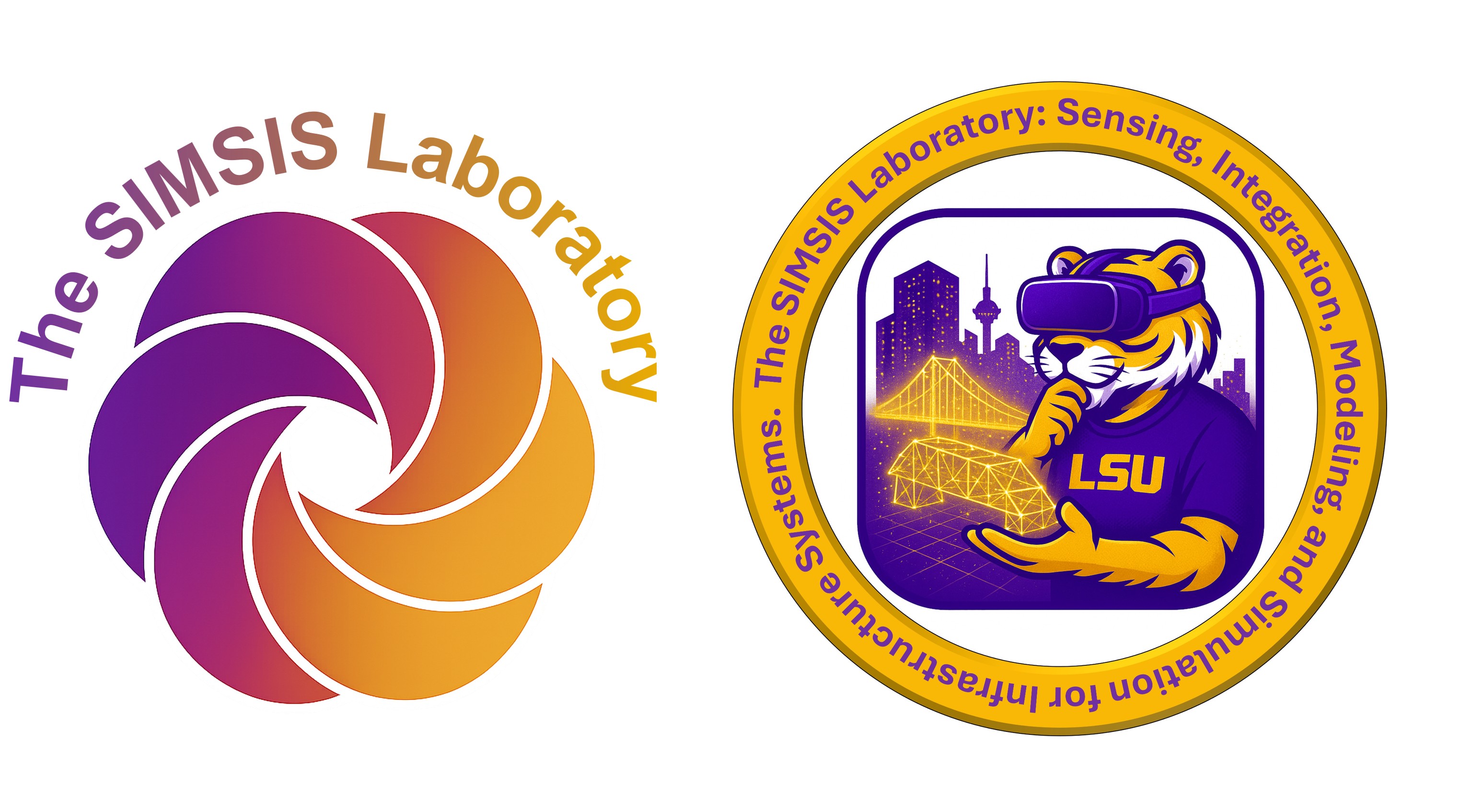
The SIMSIS Laboratory in the Department of Civil & Environmental Engineering at the Louisiana State University is dedicated to advancing the frontiers of Sensing, Integration, Modeling, and Simulation for Physical Infrastructure Systems.
The laboratory focuses on developing scalable and sustainable Digital Twin (DT) workflows and translating them into practical applications aimed at enhancing the reliability and resilience of physical infrastructure assets.
Figure. 1. DT development and application phases.
Research Background
Modern societies face mounting pressures from rapid urbanization, aging infrastructure, and more frequent natural disasters, demanding innovative strategies to monitor, manage, and optimize critical systems in complex urban and regional settings.
Ensuring the resilience of infrastructure requires advanced tools to accurately model their behavior over time. Digital twins—dynamic, data-driven virtual models—enable intelligent decision-making, enhance system resilience, and optimize lifecycles.
Ensuring the resilience of civil infrastructure requires advanced tools to accurately model their behavior over time. DTs—dynamic, data-driven virtual models of physical systems (civil infrastructures in our research)—have emerged as powerful enablers of intelligent decision-making, system resilience, and lifecycle optimization.
Realizing their full potential, however, depends on a seamlessly integrated and iterative framework built on three foundational pillars (as shown in Figure 1 above):
-
-
Digitization to convert physical infrastructure into structured and synchronized diverse spatial and temporal data-rich digital entities through multi-modal sensing of infrastructure;
-
Virtualization & Cognition to create dynamically updated virtual models embedded with the capability to analyze data, learn patterns, and predict future behavior, all delivered through an immersive and intuitive user experience; and
-
Human-DT Interaction to facilitate human engagement with DT system intelligence to empower users to interpret, simulate, and make decision on infrastructure insights via intuitive immersive visualization applications and intelligent decision-support tools.
-
The SIMSIS Laboratory was founded to integrate these three pillars into unified frameworks that improve infrastructure connectivity and enable intelligent, lifecycle-based management of civil infrastructure networks.
The SIMSIS Laboratory uses a hierarchical approach to DT development that balances computational feasibility with modeling fidelity. Recognizing the scale and complexity of real-world infrastructure systems, the laboratory structures its DT efforts across two complementary levels:
-
- Element-Level: Element-level DT modeling focuses on individual infrastructure assets with a higher Level of Detail (LoD), capturing fine-grained information and providing asset-specific insights for more granular, localized assessment, maintenance, and decision support.
-
- Network level: Network-level DT modeling, in contrast, addresses broader systems of infrastructure assets at a lower LoD, supporting strategic-level analysis while preserving critical infrastructure attributes and their interactions with surrounding urban dynamics.
Importantly, these levels should not be viewed as strictly separate or binary; rather, they exist along a continuum, where models may integrate characteristics from both ends to meet specific analytical, operational, or planning needs.

Furkan Lüleci, Ph.D.
Assistant Professor in the Department of CEE at LSU
Founder & Director of SIMSIS
Education
Ph.D., 2024, University of Central Florida, Orlando, FL
M.S., 2019, University of Central Florida, Orlando, FL
B.S., 2017, Eskisehir Osmangazi University, Eskisehir, Turkey
Contact
Office: Patrick F. Taylor, 3240J
SIMSIS Lab: Engineering Lab Annex Building, Room 125
Email: furkan.luleci@lsu.edu
Phone: +1 (407) – 288 4636
Recent News
June 2025: Our paper has been honored with the Best Paper Award (2023), receiving the Aftab Mufti Medal from the Society for Civil Structural Health Monitoring. Here are the links to the paper and award.
Open Positions
The lab welcomes applications from outstanding researchers for Graduate Research Assistant positions in the MS and PhD programs, and for Postdoctoral Researcher appointments. Applicants should email their CVs to furkan.luleci@lsu.edu.
